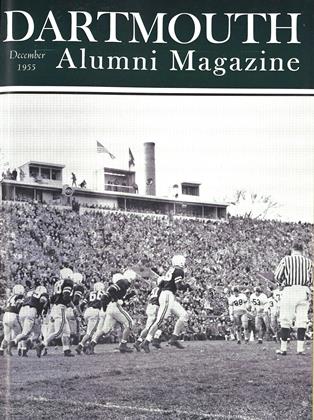1743-1776 By Carl Bridenbaugh New York: Knopf, 1955. 433 pp.$7.50.
In honor of the appearance of Cities in Revolt, Mr. Bridenbaugh's publisher has reissued his Cities in the Wilderness, long out of print. As a result we now have in a nearly uniform edition a history of American cities from 1625 to 1776.
In his second volume Mr. Bridenbaugh continues to write social history in a grand manner. Here with an exceptional amplitude of topic and detail, for the five cities of Boston, New York, Philadelphia, Charleston, and Newport, we have a treatment of city political organizations, fire-fighters and police, water works and sewerage, learned societies and Anglicans, disease, doctors and inoculation, art, publishing and colleges.
The attempt to interrelate these topics with the onrush of the colonies toward Revolution is not quite successful, but the treatment of other trends - for example, secularization, social and economic classes, and colonial unity - is effectively done.
Mr. Bridenbaugh writes a kind of history that is not, unfortunately, as fashionable as it used to be. He lias no preconceived theories, no systems; in short, he lets the facts speak for themselves. He simply believes that American cities were important and were as progressive as contemporary English cities with the exception of London, and he lets the facts prove it. If, contrary to accepted doctrine, he discovers that merchants were in favor of inflation, he marshals the evidence and lets the heresy drop. A further advantage of his approach is that the style is unencumbered with professional jargon; there are no borrowings from the related behavioral sciences.
A reliance upon factual detail may lead to surfeit, and there are times when the reader, bruised by dates, names, and prices, feels as if he had been engaged in a bout with the classified pages of the telephone directory, Duncan Hines, and colonial cities "confidential." On the other hand, this sort of saturation gives the reader a feeling of having experienced on the plane of living the urban conditions here set forth. Mr. Bridenbaugh's work is a godsend to historical novelists and to scholars who can find here an authoritative answer to the questions they are always asking themselves. It is to be hoped that he will continue his treatment until 1800, to make a chronological connection with the work done by other scholars in the field of later urban history.
 View Full Issue
View Full Issue
More From This Issue
-
 Feature
FeatureThe Meaning of a Liberal Education
December 1955 By PROF. ARTHUR E. JENSEN -
 Feature
FeatureA Course of Reading for Dartmouth Men
December 1955 By CHARLES C. MERRILL '94 -
 Feature
FeatureChairman's Report THE 1955 ALUMNI FUND
December 1955 By Roger C. Wilde '21 -
 Feature
FeatureALUMNI FUND ENDOWMENT FUNDS
December 1955 -
 Feature
FeatureChass Achierement 1955 Fund
December 1955 -
 Feature
FeatureStudent Government at Dartmouth
December 1955 By RUSSELL W. BRACE '56
Books
-
 Books
BooksTHE LIFE AND ADVENTURES OF JOHN NICOL, MARINER,
December 1936 -
 Books
BooksThe Graphic Arts in Belgium
November 1938 -
 Books
BooksAlumni Articles
OCTOBER 1967 -
 Books
BooksNEW PLANS FOR OLD TOWNS
April 1943 By Albert S. Carlson -
 Books
BooksSOME SILENT PLACES STILL.
FEBRUARY 1970 By ELLIS BRIGGS '21 -
 Books
BooksTHE UNITED STATES MARINE CORPS.
NOVEMBER 1967 By MAJOR ERIC H. WIELER, USMC


